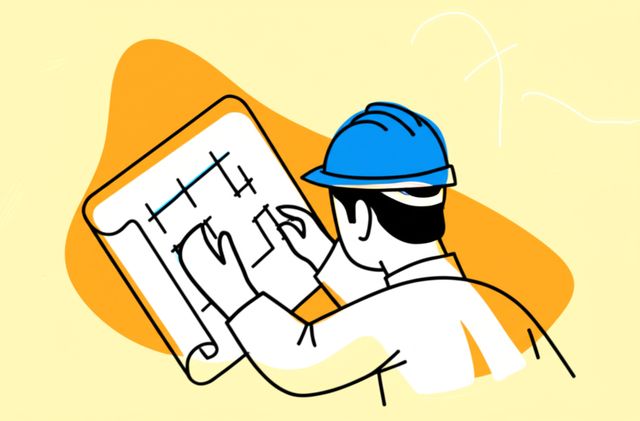Construction Project Manager
Career Guide: Construction Project Manager
A Construction Project Manager (CPM) serves as the crucial link between the blueprint and the finished structure. They oversee construction projects from the initial planning stages through to completion and handover. This involves coordinating a complex web of activities, resources, and people to ensure the project adheres to its goals.
The core mission of a CPM is threefold: deliver the project on time, stay within the allocated budget, and meet the required quality standards and specifications. Success in this role means transforming architectural visions and engineering plans into tangible realities, whether it's a new residential complex, a towering skyscraper, a vital bridge, or an industrial facility.
Working as a CPM can be highly engaging. You witness the direct results of your efforts as buildings rise from the ground up. The role demands sharp problem-solving skills to navigate the inevitable challenges of construction, coupled with strong leadership to guide diverse teams towards a common objective. It's a career path filled with dynamic environments and the satisfaction of building the world around us.
Key Responsibilities of a Construction Project Manager
The role of a Construction Project Manager is multifaceted, demanding a blend of technical expertise, management skill, and strategic thinking. Their responsibilities span the entire project lifecycle.
Planning and Scheduling Construction Phases
Effective planning is the bedrock of any successful construction project. CPMs develop detailed project plans outlining all necessary steps, from site preparation to final inspections. This involves breaking down large projects into manageable phases and tasks.
Scheduling is equally critical. CPMs create realistic timelines, sequencing activities logically and allocating appropriate durations. They utilize tools like Gantt charts and critical path analysis to identify dependencies and optimize the schedule, ensuring resources are used efficiently and milestones are met. This requires foresight to anticipate potential bottlenecks and flexibility to adjust the schedule as needed.
Constant monitoring and updating of the schedule are necessary to reflect progress and address any deviations promptly. This ensures all team members and stakeholders are aware of the project's status and upcoming activities.
These courses provide foundational and advanced knowledge in project planning and scheduling, crucial for managing construction timelines effectively.
Budget Management and Cost Estimation
Financial oversight is a major responsibility. CPMs are involved in estimating project costs, considering labor, materials, equipment, permits, and contingencies. Accurate estimation during the planning phase is vital to securing funding and setting realistic financial expectations.
Once the budget is approved, the CPM meticulously tracks expenditures throughout the project. They manage procurement, approve invoices, and monitor spending against the budget. Controlling costs involves identifying potential overruns early and implementing corrective actions, such as finding cost-saving alternatives or negotiating better prices with suppliers.
Regular financial reporting to stakeholders is also key, providing transparency on the project's financial health. Strong financial acumen helps CPMs make informed decisions that keep the project economically viable. Budgeting challenges and cost overruns are common issues in construction.
Understanding construction estimating and cost control is fundamental. These resources offer insights into managing project finances.
Coordination of Subcontractors, Suppliers, and Stakeholders
Construction projects involve numerous parties: architects, engineers, subcontractors for various trades (electrical, plumbing, HVAC), material suppliers, clients, and regulatory bodies. The CPM acts as the central coordinator, ensuring seamless collaboration among all participants.
This involves selecting and managing subcontractors, overseeing supplier deliveries, and facilitating communication. Clear and consistent communication is essential to prevent misunderstandings, resolve conflicts, and keep everyone aligned with the project goals and schedule.
CPMs organize regular meetings, provide progress updates, and manage stakeholder expectations. They must be adept at navigating different personalities and priorities to foster a productive working environment where teams collaborate effectively.
Risk Assessment and Mitigation Strategies
Construction sites are inherently risky environments. CPMs are responsible for identifying potential risks, which can range from safety hazards and design errors to material shortages, labor disputes, permit delays, and unexpected site conditions.
Effective risk management involves assessing the likelihood and potential impact of each risk. Based on this assessment, CPMs develop mitigation strategies and contingency plans. This might include implementing stringent safety protocols, securing backup suppliers, or building buffer time into the schedule.
Ongoing risk monitoring throughout the project allows CPMs to address emerging issues proactively. This proactive approach minimizes disruptions, protects workers, and helps ensure the project stays on track regarding budget and timeline.
These resources delve into risk management specifically within the construction context.
Educational Pathways to Becoming a Construction Project Manager
Aspiring Construction Project Managers can follow several educational and experiential paths. While practical experience is invaluable, formal education and certifications often accelerate career progression and are increasingly preferred by employers.
Relevant Undergraduate Degrees
A bachelor's degree is often the standard entry point, particularly for larger firms or more complex projects. Common fields of study include Construction Management, Construction Science, Building Science, Civil Engineering, or Architecture. These programs provide foundational knowledge in construction methods, materials, structural principles, contract law, scheduling, and cost estimating.
Degrees in related fields like general business, mathematics, or engineering can also serve as a strong foundation, especially when supplemented with construction-specific coursework or experience. An associate degree combined with significant field experience can also be a viable path, though a bachelor's degree may offer more direct routes to management roles.
Pursuing relevant degrees provides the theoretical knowledge essential for understanding the complexities of construction projects.
Certifications and Credentials
Professional certifications can significantly enhance a CPM's credentials and demonstrate specialized expertise. While not always mandatory, they can distinguish candidates in the job market and potentially lead to higher salaries.
Widely recognized certifications include:
- Project Management Professional (PMP): Offered by the Project Management Institute (PMI), the PMP is a globally respected certification validating general project management skills, applicable across industries but highly valued in construction.
- PMI Construction Professional (PMI-CP): Also from PMI, this certification specifically targets the construction industry, covering areas like contract management, stakeholder engagement, and risk specific to construction projects.
- Certified Construction Manager (CCM): Offered by the Construction Management Association of America (CMAA), the CCM is considered a "gold standard" for construction management professionals, signifying extensive experience and expertise in CM practices.
- Leadership in Energy and Environmental Design (LEED): Credentials like LEED Green Associate or LEED AP, offered by the U.S. Green Building Council (USGBC), demonstrate expertise in sustainable building practices, a growing trend in the industry.
- OSHA Safety Certifications: Certifications from the Occupational Safety and Health Administration demonstrate a commitment to and knowledge of crucial worksite safety regulations.
Choosing the right certification often depends on career goals and specific areas of interest, such as sustainability or general project management prowess.
Preparing for these certifications often involves dedicated study. These courses can help prepare for relevant certification exams.
Apprenticeships and On-the-Job Training
Practical experience is indispensable in construction. Many successful CPMs begin their careers in hands-on roles within the industry, such as craft workers, field engineers, assistant project managers, or project coordinators. These positions provide invaluable exposure to the realities of construction sites, building processes, and team dynamics.
Apprenticeship programs offer structured training that combines on-the-job learning with classroom instruction, providing a solid foundation in a specific trade. While not a direct path to management, experience gained through apprenticeships builds essential technical understanding.
Regardless of the starting point, accumulating years of diverse experience across different project types and phases is crucial for developing the competence required for a management role. Employers highly value candidates who have proven their ability to handle the day-to-day challenges of construction.
Continuing Education and Lifelong Learning
The construction industry is constantly evolving due to new technologies, materials, regulations, and methodologies. Therefore, lifelong learning is essential for staying current and effective as a CPM. This involves staying updated on building codes, safety standards, environmental regulations, and emerging construction technologies like BIM or drone applications.
Continuing education can take many forms, including workshops, seminars, industry conferences, and online courses. Many certifications also require ongoing professional development units (PDUs) to maintain active status. Engaging in continuous learning not only enhances skills but also demonstrates a commitment to professional growth.
OpenCourser's Learner's Guide offers resources on how to effectively use online courses for professional development and staying current in your field.
Essential Skills and Competencies
A successful Construction Project Manager possesses a unique combination of technical know-how, interpersonal abilities, and business sense. Mastering these skills is essential for navigating the complexities of the construction world.
Technical Proficiency
CPMs need a solid grasp of construction methods, materials, and technologies. This includes the ability to read and interpret complex architectural and engineering blueprints and specifications. Understanding the sequence of construction activities and the requirements of various trades is fundamental.
Proficiency with industry-specific software is increasingly important. This includes project management software for scheduling and tracking (Primavera P6, Microsoft Project, Procore), Building Information Modeling (BIM) software (Autodesk Revit, Navisworks) for 3D modeling and clash detection, and estimating software.
Technical understanding allows CPMs to oversee work quality, anticipate challenges, and communicate effectively with technical teams.
Developing technical skills often involves hands-on experience and targeted training. These online courses cover essential software and technical areas for CPMs.
Interpersonal and Leadership Skills
Soft skills are just as critical as technical ones. CPMs must be effective leaders, capable of motivating diverse teams and fostering collaboration. Excellent communication skills—verbal, written, and presentation—are paramount for interacting with clients, crews, subcontractors, and executives.
Strong negotiation skills are needed for dealing with contracts, change orders, and resolving disputes. Problem-solving abilities allow CPMs to address unexpected issues quickly and effectively. Time management and organizational skills are essential for juggling multiple tasks and deadlines.
Conflict resolution skills help manage disagreements among stakeholders or team members. Attention to detail ensures quality control and adherence to specifications. Ultimately, a CPM must build trust and respect to lead projects successfully.
Regulatory and Legal Knowledge
Navigating the complex web of regulations is a key part of the job. CPMs must have a working knowledge of local, state, and federal building codes, zoning regulations, environmental laws, and safety standards (like those set by OSHA).
Understanding construction contracts is also vital. CPMs need to be familiar with different contract types, terms, and conditions to manage agreements with clients, subcontractors, and suppliers effectively. This knowledge helps in administering contracts fairly and mitigating legal risks.
Staying updated on changes in regulations and legal requirements is crucial for ensuring compliance and avoiding costly penalties or project delays.
These resources provide insights into construction contracts and law, essential for managing legal and regulatory aspects.
Financial Acumen
CPMs need strong financial management skills to keep projects profitable. This involves more than just tracking expenses; it includes understanding cost estimation techniques, budget forecasting, and cash flow management.
They must be able to analyze financial data, identify trends, and make sound financial decisions. This might involve evaluating the cost implications of design changes, assessing the financial health of subcontractors, or negotiating payment terms.
Presenting financial reports clearly to stakeholders and justifying budget decisions requires both analytical skill and effective communication. Financial acumen ensures the project not only meets its physical objectives but also its financial ones.
Career Progression for Construction Project Managers
A career in construction project management offers significant opportunities for growth and advancement. The path typically involves gaining experience, developing skills, and potentially pursuing further education or certifications.
Typical Entry-Level Roles
Most individuals don't start immediately as a Construction Project Manager. Common entry points include roles like Assistant Project Manager, Project Coordinator, Field Engineer, or sometimes a specialized role within a trade. These positions provide essential hands-on experience with site operations, documentation, scheduling, and coordinating tasks under the guidance of experienced managers.
Working in these roles helps build foundational knowledge of construction processes, project lifecycles, and the challenges faced on site. It's a crucial period for learning the ropes, developing technical skills, and understanding team dynamics. Success in these initial roles often paves the way for promotion to a full Project Manager position.
These entry-level career paths provide the necessary groundwork for becoming a CPM.
Mid-Career Advancement Opportunities
After gaining several years of experience and demonstrating competence in managing smaller projects or specific project phases, individuals typically advance to the role of Construction Project Manager. Here, they take on full responsibility for overseeing projects from inception to completion.
With further experience managing larger and more complex projects successfully, CPMs can progress to Senior Project Manager roles. Senior PMs often handle multiple projects simultaneously, manage larger teams, mentor junior staff, and take on more significant strategic and financial responsibilities.
This stage often involves specializing in particular types of construction (e.g., healthcare facilities, high-rises, infrastructure) or developing expertise in specific areas like risk management or sustainable construction.
Senior and Executive-Level Positions
Experienced and high-performing Senior Project Managers can move into executive-level positions. Roles such as Program Manager (overseeing multiple related projects), Director of Construction, Operations Manager, or Vice President of Operations involve broader strategic oversight, business development, and leadership across the organization.
These roles require extensive industry experience, strong leadership capabilities, business acumen, and a proven track record of delivering successful projects. Compensation at this level can be substantial, reflecting the significant responsibilities involved.
General management skills become increasingly important at this level. Consider exploring resources in Management to build these competencies.
Salary Expectations and Influencing Factors
Construction Project Management is generally a well-compensated field. According to the U.S. Bureau of Labor Statistics (BLS), the median annual wage for construction managers was $106,980 in May 2024. Other sources report average annual salaries ranging from around $97,000 to $118,000, with significant variation.
Salaries are influenced by several factors. Experience plays a major role, with earnings typically increasing significantly over a career. Education level can also impact pay, with bachelor's and master's degrees often correlating with higher salaries. Industry sector matters; heavy/civil engineering and nonresidential building construction tend to offer higher median incomes than residential construction. Location is also key, with higher salaries often found in major metropolitan areas or regions with high construction activity and cost of living. Certifications like PMP or CCM can also positively influence earning potential.
The job outlook for construction managers is strong. The BLS projects employment to grow 9 percent from 2023 to 2033, much faster than the average for all occupations, with about 45,800 openings projected each year. This growth is driven by the need for new buildings, infrastructure improvements, and retrofitting existing structures for energy efficiency.
Alternative Career Paths
The skills and experience gained as a CPM are transferable to various other roles. Some experienced CPMs transition into construction consulting, providing expert advice to clients or other firms. Others move into real estate development, leveraging their understanding of the construction process to manage development projects.
Facilities management, overseeing the maintenance and operation of existing buildings, is another potential path. Some may pursue roles in construction law, arbitration, or become educators, teaching construction management at vocational schools or universities. The robust skillset developed as a CPM opens doors to diverse opportunities within and beyond the traditional construction sector.
These related careers leverage the skills acquired in construction project management.
Industry Trends Impacting Construction Project Managers
The construction industry is undergoing significant transformation, driven by technological advancements, sustainability imperatives, and market dynamics. Staying abreast of these trends is crucial for CPMs to remain effective and competitive.
Adoption of Sustainable Construction Practices
Sustainability is no longer a niche concern but a core aspect of modern construction. There's a growing demand for green buildings that minimize environmental impact and maximize energy efficiency. This trend is fueled by regulations, client demand, and a growing awareness of environmental responsibility.
CPMs are increasingly involved in projects incorporating sustainable materials (like recycled steel, sustainable timber, low-carbon concrete), energy-efficient designs (passive solar, advanced insulation, smart windows), renewable energy sources (solar panels), and water conservation techniques. Practices like waste reduction through recycling and reuse (circular economy principles) are becoming standard. Familiarity with green building standards like LEED is a valuable asset.
Explore sustainability further through OpenCourser's resources on Sustainability and Environmental Sciences.
Digital Transformation and Technology Adoption
Technology is revolutionizing how construction projects are managed. Building Information Modeling (BIM) has become fundamental, providing intelligent 3D models that integrate data across the project lifecycle, improving collaboration and reducing errors.
Other impactful technologies include drones for site surveys, progress monitoring, and safety inspections; the Internet of Things (IoT) for real-time data collection from equipment and the environment; robotics and automation for specific construction tasks; and augmented/virtual reality (AR/VR) for design visualization and training. Project management software continues to evolve, incorporating AI for predictive analytics, risk assessment, and scheduling optimization.
Prefabrication and modular construction, facilitated by digital tools, are gaining traction for their potential to improve efficiency, quality control, and reduce waste and site disruption. CPMs need to be technologically adept to leverage these tools effectively.
These courses cover technologies transforming the construction landscape.
Labor Market Challenges and Material Costs
The construction industry faces persistent challenges, including skilled labor shortages and fluctuating material costs. Finding and retaining qualified workers remains difficult in many regions, impacting project timelines and budgets. CPMs must navigate these challenges through effective workforce planning, training initiatives, and potentially adopting labor-saving technologies.
Material costs can be volatile due to supply chain disruptions, global trade issues, and market demand. CPMs need robust procurement strategies, accurate cost forecasting, and contingency planning to manage these fluctuations effectively. These market pressures require CPMs to be adaptable and resourceful in managing project resources.
Global Infrastructure Investment Trends
Investment in infrastructure—transportation, energy, water systems, communications—is a significant driver of construction activity globally. Government initiatives and private sector investments in upgrading aging infrastructure and developing new facilities create substantial opportunities for construction projects and the managers who lead them.
Understanding these large-scale trends can help CPMs identify potential growth areas and position themselves for opportunities in sectors experiencing high investment. Emerging markets, in particular, may offer significant potential as they develop and modernize their infrastructure.
Keeping up with economic trends impacting construction can be helpful. Reputable sources like the Bureau of Labor Statistics Occupational Outlook Handbook provide valuable insights into industry growth and economic factors.
Challenges and Risk Management
Construction project management is inherently challenging, involving numerous variables and potential pitfalls. Effectively managing risks and overcoming obstacles is central to the role.
Common Project Risks and Mitigation
Projects frequently encounter risks that can derail progress. Common issues include poorly defined goals or scope creep, inaccurate initial estimates leading to budget overruns, and schedule delays caused by factors like weather, supplier issues, or labor shortages. Safety incidents are also a critical risk area requiring constant vigilance.
Mitigation involves thorough planning, clear goal definition, realistic estimating, building buffer time into schedules, implementing robust safety programs, and having contingency plans. Access to real-time data through project management systems helps identify potential problems early, allowing for timely intervention.
Overcoming these hurdles requires proactive management and problem-solving skills.
Managing Stakeholder Conflicts
With numerous stakeholders involved (clients, designers, contractors, regulators, community members), conflicting priorities and expectations are common. Miscommunication or lack of clear communication channels can exacerbate these issues, leading to disputes and delays.
Effective CPMs establish clear lines of communication from the outset and maintain regular contact with all parties. They actively manage stakeholder expectations, mediate disagreements, and employ strong negotiation skills to find mutually acceptable solutions. Building trust and fostering a collaborative environment are key to preventing and resolving conflicts.
These books offer insights into managing the contractual and interpersonal aspects that often lead to conflicts.
Legal and Contractual Complexities
Construction projects operate within a framework of complex contracts and regulations. Understanding contract terms, managing change orders properly, ensuring compliance with all legal requirements, and handling documentation meticulously are essential to avoid disputes and litigation.
Issues like payment delays, differing site conditions, or disputes over work quality can escalate into legal challenges if not managed carefully. CPMs must be diligent in contract administration, maintain thorough records, and seek legal counsel when necessary. Haphazard document management can lead to significant problems.
Stress Management in High-Pressure Environments
The responsibility of delivering large, costly projects on time and within budget creates a high-pressure work environment. CPMs often face tight deadlines, long hours, unexpected crises, and the constant need to juggle competing demands.
Managing stress effectively is crucial for long-term success and well-being in this career. This involves developing coping mechanisms, maintaining work-life balance where possible, delegating tasks effectively, and building a supportive team environment. Strong organizational skills and the ability to prioritize tasks can also help manage the workload and reduce stress levels.
Tools and Technologies for Modern Construction Project Managers
Technology plays an increasingly vital role in modern construction management, enhancing efficiency, collaboration, and decision-making. Proficiency with key tools is becoming essential for competitive CPMs.
Project Management Software
Dedicated project management software is indispensable for planning, scheduling, resource allocation, and progress tracking. Popular platforms in the construction industry include Oracle Primavera P6, Procore, Microsoft Project, Asana, and ClickUp.
These tools help CPMs create detailed schedules, manage budgets, track tasks, facilitate communication, and generate reports. They provide a centralized hub for project information, improving transparency and coordination among team members and stakeholders. Learning to leverage the full capabilities of these platforms is a key skill.
Online courses offer practical training in widely used project management software.
Building Information Modeling (BIM) Systems
Building Information Modeling (BIM) represents a paradigm shift from traditional 2D drawings to intelligent, data-rich 3D models. Software like Autodesk Revit and Navisworks are industry standards.
BIM allows teams to visualize the project in three dimensions, detect clashes between different systems (e.g., plumbing hitting structural beams) before construction begins, and embed information about components, costs, and schedules directly into the model. This facilitates better collaboration, reduces errors and rework, improves cost estimation, and supports lifecycle management of the building. CPMs increasingly need to understand and utilize BIM workflows.
Mastering BIM software is a valuable skill for modern CPMs. Consider these courses:
Drones and IoT in Site Monitoring
Unmanned Aerial Systems (UAS), or drones, are increasingly used on construction sites for various tasks. They can conduct site surveys quickly, monitor construction progress through aerial photography and videography, perform safety inspections in hard-to-reach areas, and create updated site maps.
The Internet of Things (IoT) involves embedding sensors in equipment, materials, or even structures to collect real-time data. This data can monitor equipment health, track material locations, measure environmental conditions (like temperature or humidity for concrete curing), or even monitor structural integrity, providing valuable insights for project management and safety.
Data Analytics for Performance Tracking
The vast amount of data generated throughout a construction project (schedule progress, costs, labor hours, material usage, safety incidents) can be leveraged through data analytics. By analyzing this data, CPMs can gain deeper insights into project performance, identify trends, and spot potential issues earlier.
Analytics can help optimize schedules, improve cost forecasting accuracy, predict potential risks, and benchmark performance against industry standards. As data collection becomes more automated through software and IoT devices, the ability to interpret and act on this data becomes an increasingly important skill for data-driven decision-making in construction management.
While specific construction analytics courses might be specialized, foundational knowledge in data analysis is beneficial. Explore related topics on OpenCourser like Data Science.
Construction Project Manager Roles in International Markets
For CPMs seeking broader horizons, international markets can offer unique opportunities and challenges. Working abroad requires navigating different regulatory environments, cultural norms, and logistical complexities.
Visa and Licensing Requirements
Working internationally typically requires obtaining the appropriate work visas and permits, the specifics of which vary greatly by country. Professional licensing requirements for construction managers can also differ significantly from those in one's home country.
Thorough research into the legal and professional requirements of the target country is essential before pursuing international work. Companies specializing in international placements often assist with navigating these bureaucratic hurdles.
Cultural Considerations in Global Projects
Cultural differences can profoundly impact project management styles, communication norms, negotiation tactics, and team dynamics. What constitutes effective leadership or clear communication in one culture might be perceived differently in another.
Successful international CPMs develop cross-cultural competence, learning to adapt their approach to suit the local context. This involves understanding local business etiquette, respecting cultural norms, and building relationships based on mutual understanding and trust.
Emerging Markets and Demand
Rapidly developing economies often present significant demand for construction expertise due to large-scale infrastructure projects, urbanization, and industrial growth. Regions in Asia, the Middle East, Africa, and Latin America may offer substantial opportunities for experienced CPMs.
However, working in emerging markets can also involve unique challenges, such as less developed regulatory frameworks, potential political instability, and different supply chain dynamics. Assessing both the opportunities and risks associated with a specific international market is crucial.
Language and Communication Strategies
While English is often the business language on large international projects, proficiency in the local language can be a significant advantage, facilitating smoother communication with local teams, suppliers, and authorities.
Even without fluency, employing clear, concise communication, utilizing visual aids, confirming understanding frequently, and potentially working with translators are important strategies for overcoming language barriers and ensuring effective collaboration across diverse international teams.
Developing language skills can be beneficial. Explore language learning options on OpenCourser's Languages page.
Frequently Asked Questions
Here are answers to some common questions about pursuing a career as a Construction Project Manager.
Can you become a CPM without a construction-related degree?
Yes, it is possible, but increasingly challenging, especially for larger projects or companies. Many successful CPMs enter the field with degrees in other areas or work their way up through extensive hands-on experience in the trades or related construction roles. However, a degree in construction management, civil engineering, or a related field provides a strong theoretical foundation and is often preferred by employers. Regardless of educational background, significant practical experience is almost always essential.
How critical are certifications for career advancement?
Certifications like PMP, PMI-CP, CCM, or LEED credentials are often not strictly required but can be highly beneficial. They validate your knowledge and skills to employers, potentially setting you apart from other candidates and leading to better job prospects or higher salaries. For certain specialized roles or government contracts, specific certifications might be mandatory. They also demonstrate a commitment to professional development.
What are the most stressful aspects of the job?
The role often involves high levels of stress due to the pressure to meet tight deadlines and budgets. Managing unexpected problems (like weather delays, material shortages, or design errors), resolving conflicts among stakeholders, ensuring site safety, and often working long hours contribute to the pressure. The financial stakes are high, and the responsibility for project success rests heavily on the CPM.
How does this role differ from general project management?
While sharing core project management principles (planning, budgeting, scheduling, risk management), Construction Project Management requires deep, industry-specific knowledge. This includes understanding construction methods, materials, blueprints, building codes, safety regulations, and contract law specific to the industry. CPMs typically spend significant time on construction sites, dealing with the physical aspects of the build, which differs from many office-based general project manager roles.
Is remote work possible in this field?
Due to the hands-on nature of overseeing construction sites, the role of a CPM is traditionally site-based and offers limited opportunities for fully remote work. However, some aspects of the job, such as planning, budgeting, reporting, and virtual meetings, can potentially be done remotely, leading to hybrid arrangements in some companies. Technology is enabling more remote monitoring and management capabilities, but a physical presence on site remains crucial for effective oversight in most cases.
What industries have the highest demand or pay for CPMs?
Demand for CPMs exists across various sectors, including residential, commercial, industrial, and infrastructure construction. Generally, roles in heavy and civil engineering construction (e.g., bridges, highways, utilities) and large-scale nonresidential building projects (e.g., hospitals, skyscrapers, factories) tend to offer higher median salaries compared to residential construction. Industries like industrial, commercial, and mining are also cited as higher-paying sectors.
Embarking on Your Construction Project Management Journey
Becoming a Construction Project Manager is a demanding yet rewarding career path for individuals who thrive on challenge, leadership, and seeing tangible results. It requires a blend of technical knowledge, sharp management skills, and the ability to navigate complex projects and diverse teams. While the path requires dedication, education, and continuous learning, the strong job outlook and potential for significant career growth make it an attractive field for ambitious individuals interested in shaping the built environment.
Whether you are starting your educational journey, considering a career pivot, or looking to advance within the industry, resources like online courses and professional certifications can provide valuable knowledge and credentials. Explore the vast library of courses related to Engineering, Architecture, and Management on OpenCourser to build your foundation or enhance your expertise for a successful career in construction project management.

























